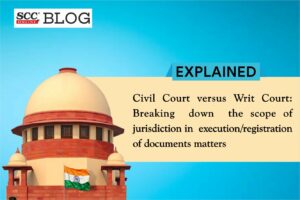Supreme Court: The bench of Hemant Gupta and V. Ramasubramanian*, JJ has lucidly explained the law on the jurisdiction in case of disputes relating to execution and registration of deeds and documents under the Registration Act, 1908.
Three steps for Registration of a document
- Execution of the document, by the executant signing or affixing his left hand thumb impression: This step may be challenged in a suit for declaration that the registered document is null and void, either on the ground that the executant did not have a valid title to pass on or on the ground that what was found in the document was not the signature of the executant or on the ground that the signature of the executant was obtained by fraud, coercion etc.
- Presenting the document for registration and admitting to the Registering Authority the execution of such document: This may also be challenged on the very same grounds as in the First step.
- Registration of the document: This step is procedural in nature where the Registering Authority is the lead actor.
Jurisdiction of Civil Court versus Writ Court
The objections to the first and second of the aforesaid three steps are substantial and they strike at the very root of creation of the document.
“A challenge to the very execution of a document, is a challenge to its very DNA and any defect or illegality on the execution, is congenital in nature. Therefore, such a challenge, by its very nature, has to be made only before the civil court and certainly not before the writ court.”
If a civil court finds that the sale by a power agent was unauthorised, then the question whether the Registering Officer performed his duties properly or not, would lose its significance. An attack on the authority of the executant of a document, is not to be mixed with the attack on the authority of the Registering Officer to register the document. The distinction between the execution of a document and the registration of the document is to be borne in mind while dealing with these questions.
To put it more clearly, if a party questions the very execution of a document or the right and title of a person to execute a document and present it for registration, his remedy will only be to go to the civil court. But where a party questions only the failure of the Registering Authority to perform his statutory duties in the course of the third step, it cannot be said that the jurisdiction of the High Court under Article 226 stands completely ousted.
This is for the reason that the writ jurisdiction of the High Court is to ensure that statutory authorities perform their duties within the bounds of law. When a High Court, in exercise of its jurisdiction under Article 226 finds that there was utter failure on the part of the Registering Authority to stick to the mandate of law, the Court merely cancels the act of registration, but does not declare the very execution of the document to be null and void.
“A declaration that a document is null and void, is exclusively within the domain of the civil court, but it does not mean that the High Court cannot examine the question whether or not the Registering Authority performed his statutory duties in the manner prescribed by law.
Examining whether the Registering Authority did something in the manner required by law or otherwise, is certainly within the jurisdiction of the High Court under Article 226. However, it is needless to say that the High Courts may refuse to exercise jurisdiction in cases where the violations of procedure on the part of the Registering Authority are not gross or the violations do not shock the conscience of the Court.
“Lack of jurisdiction is completely different from a refusal to exercise jurisdiction.”
[Asset Reconstruction Company (India) Limited v. SP Velayutham, 2022 SCC OnLine SC 544, decided on 04.05.2022]
*Judgment by: Justice V. Ramasubramanian
Counsels
For appellant: Senior Advocates Guru Krishna Kumar and Nakul Devan,
For respondents: Senior Advocates Shyam Divan, Atul Nanda Mukul Rohatgi

